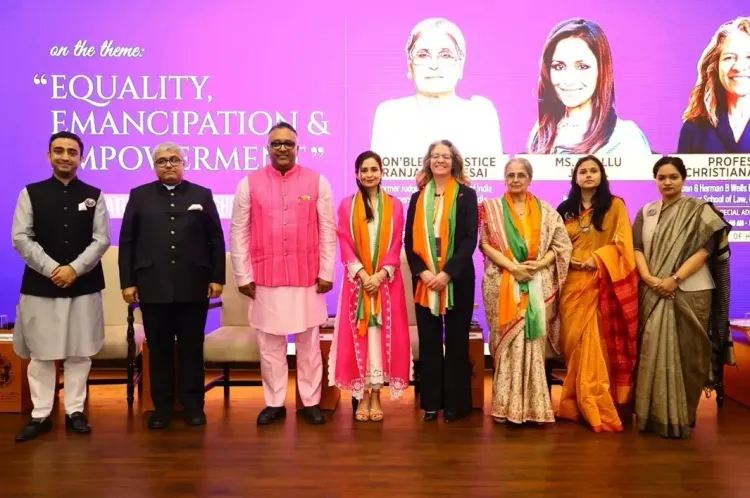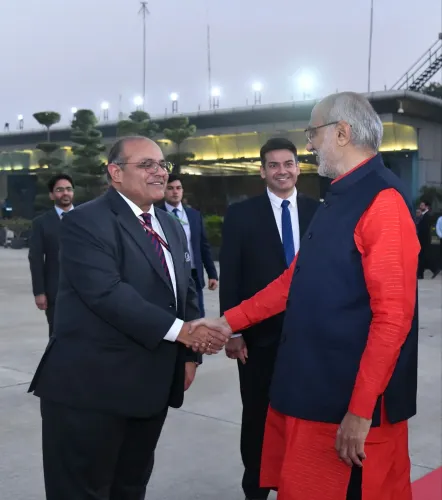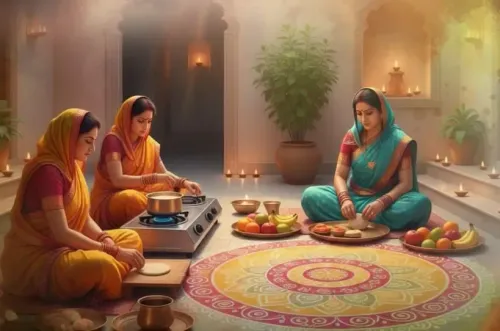'Towards Equality, Emancipation, and Empowerment': O.P. Jindal Global University Hosts National Convention on Women

Synopsis
Key Takeaways
- Significant contributions of women to history and society are highlighted.
- Ongoing challenges in achieving gender equality and empowerment are discussed.
- Importance of education in enhancing women's roles in leadership.
- Collaborative efforts are necessary for meaningful change in gender equality.
- Women’s representation in various fields is growing, but disparities remain.
Sonipat (Haryana), March 9 (NationPress) In celebration of International Women’s Day (IWD 2025), O.P. Jindal Global University is conducting a three-day National Convention on Women in India titled 'Towards Equality, Emancipation, and Empowerment', at its campus in Sonipat.
The Convention, which commenced on March 8 and continues until March 10, unites a wide array of esteemed voices on women's issues and gender from various sectors including academia, industry, civil society, public administration, media, arts, and literature.
During her keynote speech, the Guest of Honour, former Supreme Court judge and current Chairperson of the Press Council of India, Justice Ranjana P. Desai, emphasized: "It is the duty of every citizen of India to renounce practices derogatory to the dignity of women. The Supreme Court has issued several judgments affirming women's rights to equality, supported by various legislations. This presents a strong legal foundation to help women assert their right to equality."
"Women in India have faced societal restrictions that have roots in long-standing cultural interpretations. Historically, women were at risk and reliant on men. The lack of education further exacerbated this dependence. Today, we see women thriving in diverse fields: as judges, lawyers, entrepreneurs, Chief Ministers, and even astronauts! Women Prime Ministers have emerged in all South Asian nations. However, we must ensure that our sisters in rural areas are not left behind, and it is our responsibility to guarantee their access to opportunities.”
Delivering the inaugural address on the theme 'Equality, Emancipation and Empowerment', Jindal Foundation Chairperson Shallu Jindal stated: "We must acknowledge and honor the tremendous contributions of women to our nation's history, economy, and society that have paved the way for a vision of equality, emancipation, and empowerment. The freedom struggle was not solely about independence from colonial rule but also about recognizing women's voices and their equal role in nation-building. The legacy of Indian women freedom fighters lives on in every young girl who dares to dream, in every woman who challenges societal norms, and in every entrepreneur who aspires to create a future full of possibilities."
"Equality, empowerment, and emancipation are not merely concepts but realities that every woman in India should experience. We should also pay tribute to the pioneering women who contributed to drafting the Indian constitution. In contemporary India, women are at the forefront of corporations, holding senior governance roles, driving innovation, advocating in courts, and spearheading social change. The increasing presence of women in STEM, business, sports, law, policy-making, and the arts is a testament to the evolving landscape of our nation. Yet, challenges remain. Women's participation in the labor force is significantly underutilized. Wage discrimination and leadership recruitment bias persist. Women should not be viewed merely as placeholders in diversity initiatives; we need to cultivate inclusive environments that support women in pursuing their professional aspirations alongside personal lives."
Guest of Honour, Professor Christiana Ochoa, Dean and Herman B. Wells Endowed Professor at Maurer School of Law, Indiana University, remarked in her special address: "The enhancement of educational access, the rising involvement of women in public life, and the expansion of economic opportunities have fundamentally transformed the status of women globally. In the United States, the surge in women's higher education over the last century correlates directly with their rise in leadership roles across politics, business, and civil society. As per the World Bank, each additional year of education for a girl can increase her future earnings by up to 20 percent; women with advanced degrees earn 74 percent more over their lifetimes compared to those with only a high school diploma."
"The proportion of women in senior management positions in India has reached 36 percent, surpassing the global average of 32 percent. Furthermore, 32 percent of Indian women entrepreneurs are now leading startups, breaking barriers in traditionally male-dominated sectors and contributing to India's rapid economic growth. The correlation between our two nations highlights a broader truth: when women gain educational access, they become catalysts for change in politics, business, and society. Whether in the United States, India, or globally, education forms the cornerstone upon which equality, emancipation, and empowerment are constructed."
O.P. Jindal Global University’s Founding Vice Chancellor Prof (Dr) C. Raj Kumar emphasized the significance of gender equality, stating: "Recognized by the United Nations in 1977, International Women's Day holds new global relevance in both developed and emerging economies. The international women's movement, strengthened by four global UN women's conferences, has made this observance a rallying point for advocating women's rights and their roles in political and economic spheres."
"India has made significant progress in ensuring equity, equality, access, and social justice for women. However, gender-based discrimination remains prevalent in numerous sectors, including home, workplace, education, healthcare, and political decision-making. In an increasingly interconnected world fraught with geopolitical crises, power imbalances, severe human rights violations, and climate change, investing in women's empowerment and emancipation is crucial. In fact, the UN Report on 'Progress of Sustainable Development Goals 2023' warns that neglecting SDG 5 (Gender Equality) could jeopardize the entire 2030 Agenda for Sustainable Development. The Global Gender Gap Report 2024 indicates that achieving full gender parity will require 134 years—essentially five generations beyond the 2030 Agenda target."
The National Convention on Women in India: Towards Equality, Emancipation, and Empowerment aims to unite a multitude of voices, experiences, and insights to foster a platform that can catalyze meaningful change.
In alignment with the IWD 2025 theme, 'Accelerate Action', the Convention will reflect on the progress made in gender justice and outline the necessary steps ahead. It will delve into the systemic and structural challenges women face while seeking concrete and actionable solutions to mitigate these issues. Urgent measures are needed to dismantle barriers perpetuating gender inequality and to establish inclusive, supportive, and equitable systems, as stated by the university. This mission necessitates collaborative efforts, solidarities, and coalitions that bring together diverse voices and perspectives. Solidarity and intersectional approaches are essential for effecting meaningful change and addressing the needs of gender-diverse individuals whose experiences often remain marginalized in mainstream discussions.
In pursuit of this goal, politicians, democratic representatives, leading female experts, media figures, legal professionals, and many others will gather at JGU for panel discussions, fireside chats, and keynote speeches.
Engagements will include a deep discussion on politics and governance featuring Members of Parliament from Rajya Sabha Priyanka Chaturvedi, Dr. Fauzia Khan, Rekha Sharma, and Dr. Sasmit Patra. A session on Gender Equality in Entrepreneurship will see participation from Benu Sehgal, Chief Operating Officer of Splendor Lifestyle Products; Shruti Swaroop, Chief Executive Officer of International Inclusion Alliance; and Gauri Vatsa, Honorary Trade Commissioner of the India Africa Trade Council.
Yashasvini Jindal, Advisor at JSP Group Advisory Services Pvt. Ltd and a member of the Governing Council of O.P. Jindal Global University, will present her insights on 'Forging the Future: Women, Leadership, and Legacy in a Changing World.'
To discuss educational impacts, a session titled 'Empowering through Education: Challenges, Best Practices, and the Way Forward' will feature Pia Singh, Director at DLF Limited and Chairperson of DLF CSR Committee; Manvinder Kaur, Principal at Presidium School; Rekha Krishnan, Principal at Vasant Valley School; and B. Mahender Reddy, Chief Executive Officer of Sancta Maria International School. A special session will also address the urban-rural divide in India with Anganwadi workers.
Regarding the role of women in higher education, a session will include Dr. Madhu Chitkara, Pro-Chancellor of Chitkara University; Dr. Syeda Hameed, Former Member of the Planning Commission of India; Prof (Dr) Ananya Mukherjee, Vice Chancellor of Shiv Nadar University; Prof (Dr) Bijayalaxmi Nanda, Principal of Miranda House; and Prof Ochoa, who will evaluate the significance of education.
Popular culture, including cinema and literature, often reflects societal realities. In this context, a special session will be hosted with esteemed filmmaker Ronnie Screwvala, Founder of UTV, Producer, and Co-Founder of upGrad, focused on 'Women in Cinema.'
Bharatanatyam dancer and vocalist Geeta Chandran; former Director of the National School of Drama Kirti Jain; poet, critic, and academician Prof Sukrita Paul Kumar; and conservation architect and heritage management specialist Gurmeet Sangha Rai will explore 'Women in Literature and Arts: Past, Present, and Future.'
The three-day Convention will culminate with a keynote address by Union Minister of State for Health and Family Welfare Anupriya Patel on the theme 'Towards an Inclusive Future and a Gender Just World.'
The introductory remarks were delivered by the university’s Dean of Admissions & Outreach Prof (Dr) Upasana Mahanta, while the closing remarks were presented by Registrar Prof Dabiru Sridhar Patnaik.









